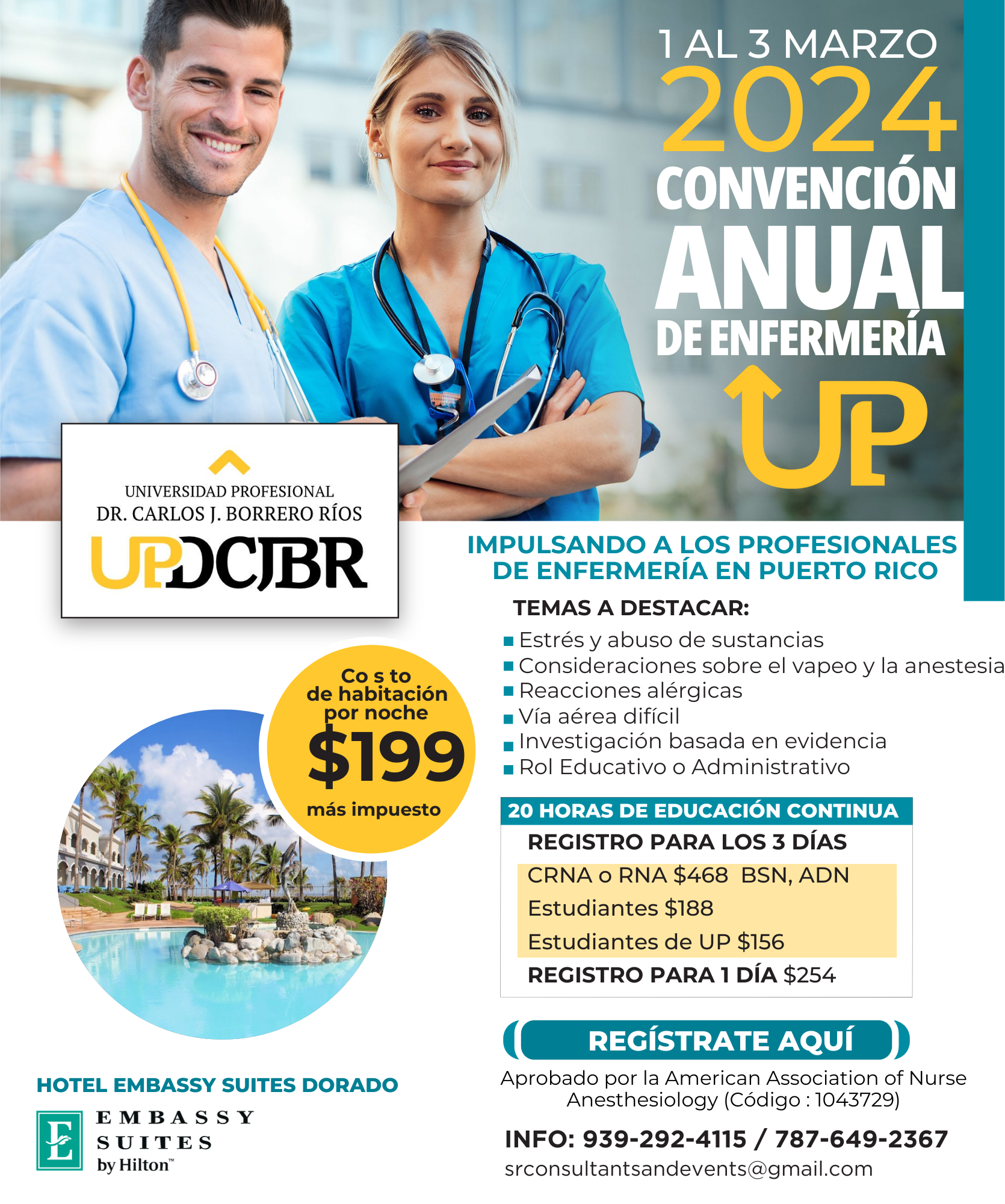DNAP Application - Admission Requirements Prior to Admission Interview
The program enrolls only students who by academic and experiential achievement are of the quality appropriate for the profession and who have the ability to benefit from their education. (The ability to benefit refers to the integrity of a college/Institution or education program to enroll only those individuals with the capacity to succeed and gain value from the education.)
Prior to an admission interview, applicants to the Nurse Anesthesia Program (DNAP) must:
1. Submit an application through the Professional University Dr. Carlos J. Borrero Ríos website, www.upcjbr.university, which is only applicable for the annual application cycle in which it is submitted.
2. Submit a non-refundable $100 supplemental application fee, which is only applicable for the annual application cycle in which it is submitted. The supplemental application fee may be paid by check, or over the phone at (787) 998-8997.
3. Submit a current, unencumbered license to practice as a professional registered nurse (RN) and/or an advanced practice registered nurse (APRN) issued through one of the states of the United States or its territories or protectorates. If that RN and/or APRN license is not issued through Puerto Rico, the applicant must be eligible for Puerto Rico licensure at the time of application.
4. Submit evidence of at least one of the following degrees from a regionally or national accredited institution:
• Bachelor of Science degree (or higher) in Nursing (BSN, MSN, DNP, etc.)
5. Submit evidence of completion of all pre-requisite courses. All pre-requisite courses must be at least three credits and completed with a grade of B or better :


6. Submit current official transcripts from all undergraduate and/or graduate institutions attended, in accordance with the guidelines in the current PUDCJBR Academic Catalog. Admission GPAs will be calculated based on credits and grades from regionally or national accredited institutions only. Failure to disclose all colleges or universities previously attended could result in denial or dismissal. Transcripts from institutions outside the United States will be required to submit a foreign credential evaluation or that coursework.
7. Present a minimum cumulative grade point average, inclusive of both undergraduate and graduate coursework, of 3.00 on a 4.00 scale.
8. Complete a minimum of one year of recent (within the last 10 years) critical care nursing experience, prior to program enrollment. The time during orientation to the critical care area cannot be considered toward the one year minimum. Two or more years of recent intensive critical care nursing experience is preferred. It is also preferred that at least a portion of this experience is with the adult patient population. Critical care experience is defined by the Council on Accreditation of Nurse Anesthesia Educational Programs (COA) as follows:
Critical care experience must be obtained in a critical care area within the United States, its territories, or a US military hospital outside of the US. During this experience, the registered professional nurse has developed critical decision making and psychomotor skills, competency in patient assessment, and the ability to use and interpret advanced monitoring techniques. A critical care area is defined as one where, on a routine basis, the registered professional nurse manages one or more of the following: invasive hemodynamic monitors (such as pulmonary artery catheter, CVP, arterial); cardiac assist devices; mechanical ventilation; and vasoactive infusions [such as norepinephrine, epinephrine, vasopressin, dobutamine, nicardipine, nitroglycerin]. Examples of critical care units may include but are not limited to: Surgical Intensive Care, Cardiothoracic Intensive Care, Coronary Intensive Care, Medical Intensive Care, Pediatric Intensive Care, and Neonatal Intensive Care. Those who have experiences in other areas may be considered, provided they can demonstrate competence with managing unstable patients, invasive monitoring, ventilators, and critical care pharmacology.
9. Submit current Basic Life Support (BLS) and Advanced Cardiac Life Support (ACLS) certification through the American Heart Association.
10. Meet the mental and physical requirements for the DNAP program, as follows:
• Have sufficient visual acuity to observe and assess a patient, discriminate color and depth, read and accurately complete reports, and visualize diagnostic/monitoring equipment in dim light.
• Have sufficient hearing to monitor and assess patient health needs, to monitor various equipment and background sounds, and to communicate by telephone.
• Be able to communicate effectively in English and Spanish in a clear and concise manner. **Some of the courses can be offered in English.
• Have Spanish communication abilities sufficient to interact professionally with others in verbal and written form, and have reading skills appropriate to understand patient charts, reports, and orders.
• Be able to lift patients to accomplish bed/Director/stretcher transfer.
• Be able to stand and walk without difficulty and be able to push a gurney or wheel Director.
• Be able to stand and/or sit for an extended period of time.
• Be able to perform fine and gross motor skills with both hands.
• Possess critical thinking skills sufficient to think clearly and act appropriately in stressful situations.
• Possess interpersonal skills sufficient to interact with individuals, families, and groups from a variety of social, emotional, cultural, and intellectual backgrounds.
• Have mobility sufficient to move from room to room and maneuver in small spaces.
• Have tactile ability sufficient to perform palpation functions of physical examination and/or those related to therapeutic intervention.
11. Submit a current professional resume. (Resumes are only effective for the annual application cycle in which they are submitted. Re-applicants must submit updated current resumes.)
12. Submit at least three letters of recommendation through yrosario@upcjbr.university. One recommendation must be from a licensed CRNA or RNA that the applicant has shadowed; one recommendation should be from the immediate supervisor, and one recommendation should be from a current RN/APRN co-worker. Recommendations from friends or family members are not accepted. (Recommendation forms are only effective for the annual application cycle in which they are submitted. Re-applicants must submit new, current reference letters.)
It is assumed that the applicant is computer literate and familiar with the use of computers at home, on the job, or in school
Licencias/Acreditaciones:



